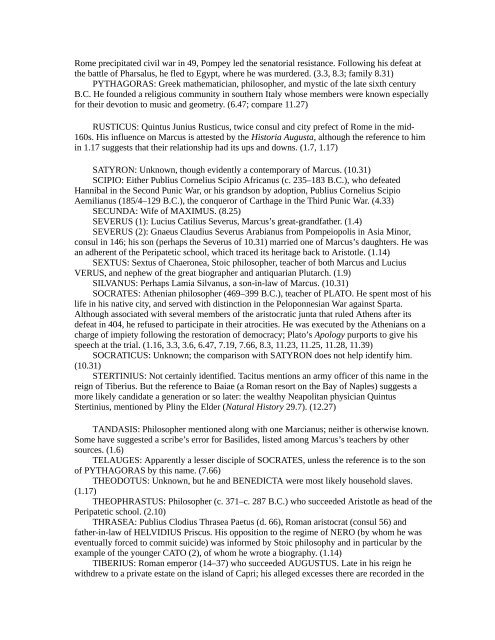9781945186240
You also want an ePaper? Increase the reach of your titles
YUMPU automatically turns print PDFs into web optimized ePapers that Google loves.
Rome precipitated civil war in 49, Pompey led the senatorial resistance. Following his defeat at<br />
the battle of Pharsalus, he fled to Egypt, where he was murdered. (3.3, 8.3; family 8.31)<br />
PYTHAGORAS: Greek mathematician, philosopher, and mystic of the late sixth century<br />
B.C. He founded a religious community in southern Italy whose members were known especially<br />
for their devotion to music and geometry. (6.47; compare 11.27)<br />
RUSTICUS: Quintus Junius Rusticus, twice consul and city prefect of Rome in the mid-<br />
160s. His influence on Marcus is attested by the Historia Augusta, although the reference to him<br />
in 1.17 suggests that their relationship had its ups and downs. (1.7, 1.17)<br />
SATYRON: Unknown, though evidently a contemporary of Marcus. (10.31)<br />
SCIPIO: Either Publius Cornelius Scipio Africanus (c. 235–183 B.C.), who defeated<br />
Hannibal in the Second Punic War, or his grandson by adoption, Publius Cornelius Scipio<br />
Aemilianus (185/4–129 B.C.), the conqueror of Carthage in the Third Punic War. (4.33)<br />
SECUNDA: Wife of MAXIMUS. (8.25)<br />
SEVERUS (1): Lucius Catilius Severus, Marcus’s great-grandfather. (1.4)<br />
SEVERUS (2): Gnaeus Claudius Severus Arabianus from Pompeiopolis in Asia Minor,<br />
consul in 146; his son (perhaps the Severus of 10.31) married one of Marcus’s daughters. He was<br />
an adherent of the Peripatetic school, which traced its heritage back to Aristotle. (1.14)<br />
SEXTUS: Sextus of Chaeronea, Stoic philosopher, teacher of both Marcus and Lucius<br />
VERUS, and nephew of the great biographer and antiquarian Plutarch. (1.9)<br />
SILVANUS: Perhaps Lamia Silvanus, a son-in-law of Marcus. (10.31)<br />
SOCRATES: Athenian philosopher (469–399 B.C.), teacher of PLATO. He spent most of his<br />
life in his native city, and served with distinction in the Peloponnesian War against Sparta.<br />
Although associated with several members of the aristocratic junta that ruled Athens after its<br />
defeat in 404, he refused to participate in their atrocities. He was executed by the Athenians on a<br />
charge of impiety following the restoration of democracy; Plato’s Apology purports to give his<br />
speech at the trial. (1.16, 3.3, 3.6, 6.47, 7.19, 7.66, 8.3, 11.23, 11.25, 11.28, 11.39)<br />
SOCRATICUS: Unknown; the comparison with SATYRON does not help identify him.<br />
(10.31)<br />
STERTINIUS: Not certainly identified. Tacitus mentions an army officer of this name in the<br />
reign of Tiberius. But the reference to Baiae (a Roman resort on the Bay of Naples) suggests a<br />
more likely candidate a generation or so later: the wealthy Neapolitan physician Quintus<br />
Stertinius, mentioned by Pliny the Elder (Natural History 29.7). (12.27)<br />
TANDASIS: Philosopher mentioned along with one Marcianus; neither is otherwise known.<br />
Some have suggested a scribe’s error for Basilides, listed among Marcus’s teachers by other<br />
sources. (1.6)<br />
TELAUGES: Apparently a lesser disciple of SOCRATES, unless the reference is to the son<br />
of PYTHAGORAS by this name. (7.66)<br />
THEODOTUS: Unknown, but he and BENEDICTA were most likely household slaves.<br />
(1.17)<br />
THEOPHRASTUS: Philosopher (c. 371–c. 287 B.C.) who succeeded Aristotle as head of the<br />
Peripatetic school. (2.10)<br />
THRASEA: Publius Clodius Thrasea Paetus (d. 66), Roman aristocrat (consul 56) and<br />
father-in-law of HELVIDIUS Priscus. His opposition to the regime of NERO (by whom he was<br />
eventually forced to commit suicide) was informed by Stoic philosophy and in particular by the<br />
example of the younger CATO (2), of whom he wrote a biography. (1.14)<br />
TIBERIUS: Roman emperor (14–37) who succeeded AUGUSTUS. Late in his reign he<br />
withdrew to a private estate on the island of Capri; his alleged excesses there are recorded in the


